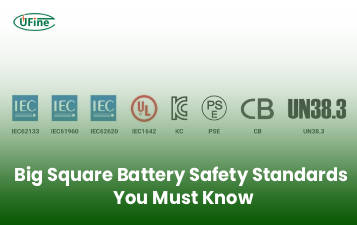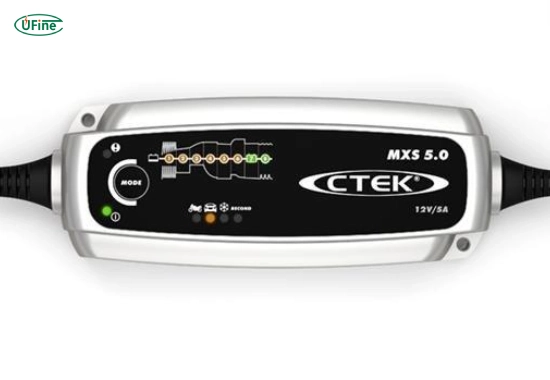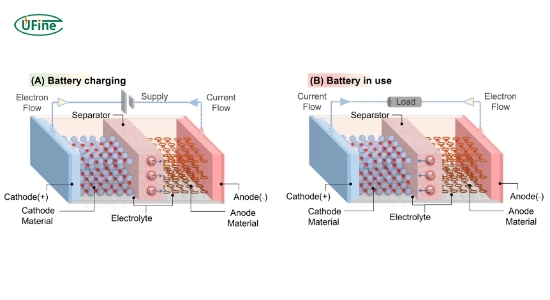
- Part 1. What is a battery conditioner?
- Part 2. How does a battery conditioner work?
- Part 3. Why lithium batteries need special care?
- Part 4. Battery conditioner vs. battery charger: What's the difference?
- Part 5. Benefits of using a battery conditioner
- Part 6. Signs your lithium battery needs conditioning
- Part 7. Best types of battery conditioners for lithium batteries
- Part 8. How to use a battery conditioner safely
- Part 9. Common myths about battery conditioners
- Part 10. Who should use a battery conditioner?
- Part 11. FAQs about a battery conditioner
What is a battery conditioner? A battery conditioner is a smart device designed to maintain and extend the life of your battery. Lithium batteries are kept charged, clean, and healthy over time.
In today’s world, where lithium batteries power everything from smartphones to solar systems, understanding how to take care of them properly is essential. That’s where a battery conditioner comes in. It quietly does the hard work of protecting and preserving your battery’s performance.
This article will take an in-depth look at what a battery conditioner is, how it works, why it’s crucial for lithium batteries, and how to choose the right one for your needs. So let’s dive in!
Part 1. What is a battery conditioner?
A battery conditioner is a maintenance device that helps improve the health and longevity of rechargeable batteries. Unlike regular chargers, battery conditioners don’t just fill your battery with power—they monitor, manage, and optimize charging.
They work by:
- Detecting battery health
- Removing sulfation (for lead-acid)
- Preventing overcharging
- Balancing cells in lithium batteries
Think of it as a smart doctor for your battery. It checks how the battery is doing and gives it only what it needs—no more, no less.
Part 2. How does a battery conditioner work?
Battery conditioners use advanced electronics to track your battery’s condition. Here’s what happens step by step:
- Initial testing: It checks voltage, temperature, and internal resistance.
- Smart charging: Charges in stages: bulk, absorption, and float.
- Pulse charging: Sends tiny pulses to break down harmful buildup.
- Maintenance mode: Keeps the battery full without overcharging.
In the case of lithium batteries, these conditioners also balance the charge across individual cells, which is vital for safety and performance.
Part 3. Why lithium batteries need special care?
Lithium batteries are powerful, lightweight, and long-lasting. But they’re also sensitive. If charged incorrectly, they can overheat, degrade, or become dangerous.
Here’s why lithium batteries benefit from a battery conditioner:
- Prevents overcharging, which can damage lithium cells.
- Avoids deep discharging, which shortens lifespan.
- Balances cells, making sure all parts of the battery are equally charged.
- Reduces heat buildup, improving overall safety.
Without proper care, lithium batteries can lose capacity quickly. A good battery conditioner ensures they stay in top shape.
Part 4. Battery conditioner vs. battery charger: What’s the difference?
You might be wondering, isn’t a battery charger enough?
Not quite. Here’s how they differ:
| Feature | Battery Charger | Battery Conditioner |
|---|---|---|
| Charges Battery | ✅ Yes | ✅ Yes |
| Monitor Battery Health | ❌ No | ✅ Yes |
| Cell Balancing | ❌ No | ✅ Yes |
| Long-Term Maintenance | ❌ No | ✅ Yes |
| Prevents Overcharging | ❌ Some | ✅ Yes |
Battery conditioners are smarter and more advanced. While chargers pump in electricity, conditioners manage the process intelligently.
Part 5. Benefits of using a battery conditioner
Using a battery conditioner brings several real-world benefits, including:
- Longer battery life: Reduces wear and tear
- Improved performance: Ensures full capacity is available
- Fewer replacements: Saves money over time
- Better safety: Prevents overheating and swelling
- Peace of mind: Set it and forget it
These advantages make a big difference for lithium batteries, which can be expensive.
Part 6. Signs your lithium battery needs conditioning
Not sure if you need one? Look for these warning signs:
- The battery drains too fast
- Takes too long to charge
- Gets hot during charging
- Shows inconsistent charge levels
- Swelling or visible damage
A battery conditioner can help fix or prevent many issues by restoring optimal charge cycles.
Part 7. Best types of battery conditioners for lithium batteries
Not all battery conditioners are made the same. For lithium batteries, look for these features:
- Lithium-compatible (LiFePO4, Li-ion, etc.)
- Multi-stage charging
- Cell balancing
- Temperature monitoring
- Overvoltage protection
- Automatic shutoff
Popular brands include NOCO, CTEK, and Victron Energy, but always check if the model supports explicitly lithium batteries.
Part 8. How to use a battery conditioner safely
Using a battery conditioner is simple, but safety matters. Here are quick tips:
- Read the manual: Always follow the manufacturer’s guidelines.
- Connect properly: Positive to positive, negative to negative.
- Use in a ventilated area: Prevents heat buildup.
- Avoid moisture: Keep it dry and clean.
- Check battery type: Make sure it supports lithium chemistry.
Using it the right way ensures you get the very best results.
Part 9. Common myths about battery conditioners
Let’s bust a few myths:
- Myth 1: Battery conditioners are only for old batteries.
Fact: They also work great on new batteries, preserving life from the start. - Myth 2: You don’t need one with lithium batteries.
Fact: Lithium batteries benefit even more due to their sensitivity. - Myth 3: It’s just a fancy charger.
Fact: It’s an innovative tool that goes way beyond simple charging.
Understanding the truth helps you make better choices.
Part 10. Who should use a battery conditioner?
Battery conditioners are ideal for:
- RV and camper owners
- Solar power users
- Boaters and marine enthusiasts
- Off-grid homeowners
- Electric vehicle owners
- Tech enthusiasts
A conditioner is a smart investment if you rely on lithium batteries for any serious use.
Part 11. FAQs about a battery conditioner
What does a battery conditioner actually do?
A battery conditioner monitors, charges, and maintains your battery for peak performance. It prevents overcharging, balances cells, and extends battery life.
Can I use a battery conditioner on any type of battery?
Not all conditioners work with every battery. Pick one that supports lithium if that’s what you’re using. Some are made for lead-acid only.
How often should I use a battery conditioner?
You can leave many conditioners connected all the time, especially smart ones. They switch to maintenance mode automatically when the battery is full.
Is a battery conditioner worth the money?
Yes, especially if you’re using expensive lithium batteries. They help you get the most life out of your investment and avoid early failure.
Can a battery conditioner fix a dead battery?
If a battery is completely dead or damaged, a conditioner can’t revive it. But it can help prevent batteries from reaching that point in the first place.
Related Tags:
More Articles

Big Square Battery Safety Standards You Must Know
Learn key safety standards for big square batteries to avoid fire risks, shipping delays, and compliance issues in EV, industrial, and energy storage projects.
Big Square Battery Applications in Solar & Industrial Equipment
Big square batteries deliver high capacity, stable output, and long life for solar, industrial, and backup power. Explore key uses and advantages.
Big Square Battery vs Cylindrical Battery: Complete 2025 Guide for EVs, ESS & Industrial Devices
Choosing the right battery is key for designers and engineers. Compare big square vs cylindrical batteries to find the best fit for your application.
How to Choose the Right Big Square Battery for Your Device?
If you’re choosing a big square battery for EVs, solar, or mobility devices, this guide helps you pick the right solution for real-world needs.
Big Square Battery Complete Guide: Types, Uses & Buying Tips
If you are choosing a big square lithium battery for EVs, solar, RVs, or AGVs, this guide helps you select the right NMC, LFP, or LTO solution with examples.




